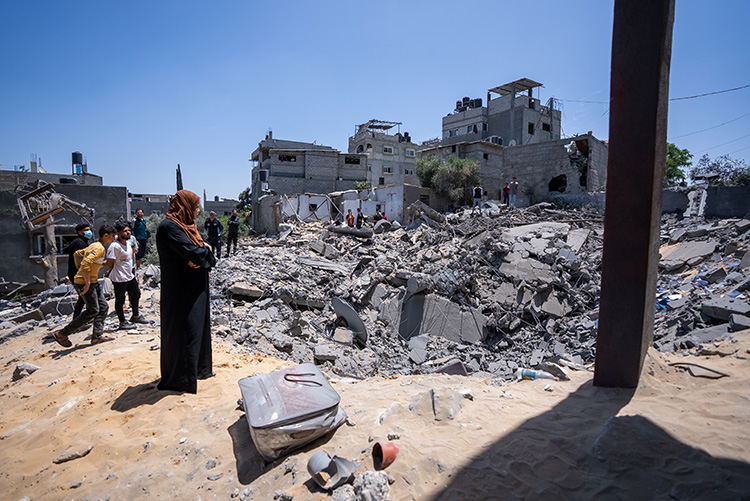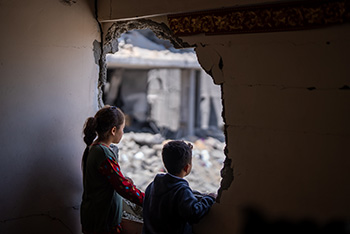
9 October 2023, Cairo, Egypt – As ministers of health from countries and territories across the WHO Eastern Mediterranean Region gather in Cairo, Egypt, for the 70th session of the WHO Regional Committee for the Eastern Mediterranean, the Region is facing an unprecedented onslaught of emergencies that are inflicting a profound and alarming impact on public health.
“The sheer magnitude and relentless frequency of these emergencies are putting the lives and well-being of millions of already vulnerable people at risk, severely testing our response capacities and threatening fragile gains made to protect public health and restore weakened health systems,” said Dr Ahmed Al-Mandhari, WHO Regional Director for the Eastern Mediterranean.
 The Region already bears the brunt of some of the world’s most protracted and complex humanitarian crises, with a total of more than 127 million people in need of urgent humanitarian assistance. In just over the last 15 months alone, the Region has witnessed unprecedented flooding in Pakistan and Libya, deadly earthquakes in Syria, Morocco and Afghanistan, and serious escalations of fighting in Sudan, the occupied Palestinian territory and northern Syria. The Region has also documented 64 disease outbreaks so far in 2023, compared with 31 outbreaks in 2021.
The Region already bears the brunt of some of the world’s most protracted and complex humanitarian crises, with a total of more than 127 million people in need of urgent humanitarian assistance. In just over the last 15 months alone, the Region has witnessed unprecedented flooding in Pakistan and Libya, deadly earthquakes in Syria, Morocco and Afghanistan, and serious escalations of fighting in Sudan, the occupied Palestinian territory and northern Syria. The Region has also documented 64 disease outbreaks so far in 2023, compared with 31 outbreaks in 2021.
In countries facing conflict and insecurity, disrupted health systems and limited access to people in need impede the humanitarian health response, putting the lives of thousands of people at risk. Disruptions include attacks on health care, inaccessible or nonfunctional health facilities, disrupted referral systems, shortages in medicines and medical supplies, and interruptions in disease prevention and control efforts.
“These crises demand nothing less than urgent, unwavering action from all parties involved to immediately and fully abide by their obligations under international humanitarian law, without hesitation or compromise,” stressed Dr Al-Mandhari. “It is our collective responsibility to prioritize health as a basic human right and work together – under our regional vision of Health for All by All – to alleviate suffering and safeguard the dignity of the most vulnerable.”
WHO calls for an immediate end to hostilities across the Eastern Mediterranean Region, where civilians caught in the cross-fire are bearing the brunt of the violence and are unable to access the life-saving care they need. In the face of these escalating crises, upholding humanitarian principles is paramount, and ensuring unhindered access to respond to urgent health needs is a moral imperative
Note to editors
In the occupied Palestinian territory, where a 16-year blockade has left the Gaza Strip’s health system severely under-resourced, escalating hostilities with Israel that began on 7 October 2023 are compounding an already dire situation. Power outages and shortages of medicines and health supplies in Gaza Strip hospitals are hindering the delivery of life-saving medical care. 11 attacks on health care recorded by WHO in the first 36 hours of the escalating violence have resulted in the deaths of 6 health workers and injuries to a further 4 health personnel, and affected 9 ambulances and 6 health facilities. There is an urgent need to establish a humanitarian corridor for unimpeded, life-saving patient referrals and movement of humanitarian personnel and essential health supplies.
In Afghanistan, a powerful 6.3-magnitude earthquake that struck the western region on 7 October 2023 caused widespread devastation in a country facing one of the world’s largest humanitarian crises. As of 8 October, as search and rescue efforts continue, more than 550 severe and critical cases have been admitted to 7 hospitals in Herat City, in addition to 260 dead bodies. An estimated 2100 people are reported to have been displaced and are being temporarily housed in shelters, where there is limited access to safe drinking water and space is congested. The potential for infectious diseases to increase in the aftermath of the earthquake is a concern.
Among vulnerable populations in northern Syria, including in areas still struggling to recover following the devastating earthquake of February 2023, hostilities escalated in several sites on 5 October 2023, in one of the largest attacks since 2019. Reported violence resulted in the death, injury and displacement of civilians across at least 50 villages, towns and cities. The hostilities have affected critical facilities and infrastructure, including several health facilities.
The shocking impact of Storm Daniel in Libya serves as a stark reminder of how humanitarian crises are increasingly complex and intertwined, with extreme weather events exacerbating humanitarian needs in crisis-affected countries. As at 8 October, there are 4333 confirmed deaths, and 8500 people remain missing. Contaminated water sources are increasing the risk of waterborne and vector-borne diseases such as cholera, malaria and yellow fever. Tens of thousands of people who have lost their loved ones, homes and livelihoods are in urgent need of mental health support.
Six months after the start of the conflict in Sudan, the health system – already weak and struggling because of conflict, disease outbreaks and hunger – is buckling under enormous pressure. About 70% of hospitals in conflict-affected states are nonfunctional, and operational hospitals and clinics in non-conflict states are overwhelmed by the influx of internally displaced people. Shortages of medicines and medical supplies, including treatment for chronic diseases, continue to be reported. More than 5.5 million people have been newly displaced since 15 April 2023. Further compounding the situation, a cholera outbreak was declared, on 26 September 2023, in Gedaref State.


